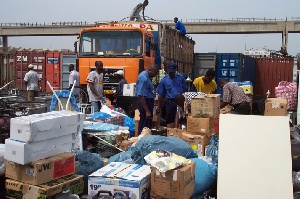Participants at a recent seminar have called for the creation of a single laboratory to provide the needs of all the regulatory agencies at the ports of the country.
They said this would help prevent the undue delays and high costs experienced by many shippers and importers in the country.
The participants made this known at a seminar, which forms part of the Ghanaian-German Economic Association’s ‘meet the government’ series held at the Novotel Hotel in Accra.
The topic for discussion was: ‘Challenges in clearing goods from the ports’ and brought together members of the Ghana Ports and Harbour Authority (GPHA), Ghana Shippers Authority (GSA), the Food and Drugs Authority (FDA) and the Customs Division of the Ghana Revenue Authority.
Mr Fred Asiedu-Darty, the Head of Public Relations of the GSA, said since it was their mandate to promote and protect the interests of shippers in the country, the GSA amongst others, regularly organises capacity building and trade facilitation measures for its members.
He said challenges experienced by many importers are felt in all the stages a shipper goes through, including: sorting the sea transport, terminal operations, cargo clearance, warehousing and inland haulage.
Mr Asiedu-Dartey said the challenges inherent in those stages are compounded as the shipper would have to meet the requirements of: the Customs Examination, Customs Chemist, Customs Prevention, Customs Taskforce, GPHA Revenue, and the GPHA Audit.
And besides these, he said, the shipper would still have to meet the demands of the Ghana Standards Authority, FDA, EPA, National Security, Destination inspection companies and the electronic tracking officials.
Mr Asiedu-Dartey said these bureaucratic procedures often lead to delays, congestion, confusion and high costs on the consumer.
Mr Solomon Agampim, Head of Import and Export Control at the FDA, said companies registered with the Registrar Generals Department and the FDA are those allowed to import certain categories of products.
He said the FDA was established to regulate the import and production of a variety of products including food, drugs, cosmetics, medical services etc and that the FDA issues permits for the importation of certain categories of products and these permits are usually valid for a year.
Mr Agampim said the role of the FDA at the ports is to ensure that food and drugs are rapidly screened and cleared through the ports to ensure public health and safety.
He said imported goods at the port are physically inspected by the FDA before its either approved, detained, seized or re-exported.
Mr Wallace Akondor, the acting Commissioner, Customs Division of the Ghana Revenue Authority, said the duty of the Customs Division is primarily to collect revenue through import and export duties.
He said it is expected that all shippers would clear their goods within seven working days after their goods arrive.
Mr Akondor reminded shippers on the need to acquire the necessary permit from the relevant authorities in order to import pharmaceutical products, industrial chemicals, frozen fish, meat and poultry products.
After the presentation, participants at the event posed a number of questions on the undue delays and bureaucracy many experienced at the port. Suggestions were also made including the merging of port institutions to help facilitate the affairs of shippers at the Ghanaian ports.
Business News of Saturday, 13 June 2015
Source: GNA

















